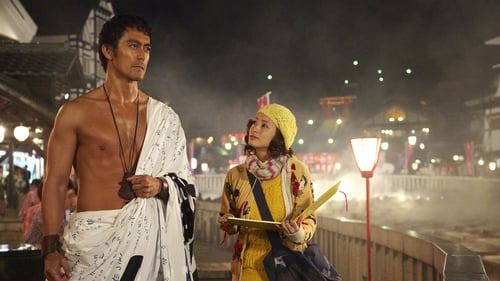
Ramen restaurant owner
In ancient Rome, bathhouse architect Lucius (Hiroshi Abe) becomes famous with designing the original "thermae" (bathhouse). He receives an order to build a thermae in the colosseum to help gladiators recover from their wounds, but faces difficulties. Thus, Lucius travels again to modern day Japan through the time slip. He meets Manami (Aya Ueto) again, who is now a reporter for a magazine which covers bathroom. With the help of the flat face Japanese tribe, Lucius again designs a new thermae. Meanwhile, Emperor Hadrian (Masachika Ichimura) wants to keep the peace with the thermae, but the Senate wants to extend the land by using force. Emperor Hadrian and the Senate now have a confrontation and Rome becomes divided.

Patient
Comedy of a phony doctor.

Taking place in Shinshu in the 1920s, Tsumakoi Okoma, while traveling to hone her gambling skills, teams up with the vagabond Tsukuba Tsuneji and comes into conflict with gamblers plotting to take over a rustic hot-spring town. Handling a gun and sword as skillfully as a man, Fuji Junko portrays an appealing personality that differs from Oryu in the Red Peony Gambler series. Tsuruta Koji stars as the vagabond Tsukuba Tsuneji that tops the list of an impressive all-star cast that includes Endo Tatsuo, Kogure Michiyo, Ashiya Gannosuke, Kitamura Eizo, and many others. This film is an authentic yakuza movie that conveys the true "Matatabi" (wandering gambler) feeling.

Chibi
When the mysterious “Joe of Spades” (Jo Shishido) executes one of the bosses of a powerful syndicate, his colleagues, fearing for their own lives, call on the services of assassin agency Murder Unincorporated to take care of the problem. This unique entry showcases some of the most peculiar killing tactics to ever hit Japanese cinema!

Mametaro

An entertaining historical drama featuring popular comedians from the Kansai region of the time, such as Makoto Fujita, Minoru Shiraki, and Gannosuke Ashiya. Raizo Ichikawa as the famous yakuza boss Jirocho.


The adopted son of an Osaka courier falls in love with a prostitute and, discovering that she is about to be purchased by a client, steals money from his employer to redeem her. Hunted criminals, the two young lovers take flight to Yamato, but, as in Chikamatsu's other domestic tragedies of love and duty (known as sewamono), they must be pursued and their passion destroyed by death. Favourite Uchida themes, such as the indenturing of a prostitute (cf. YOSHIWARA; A BLOODY SPEAR AT MT. FUJI), and his characteristic emphasis on performance and theatrical artifice re-emerge here; but the daring device of having Chikamatsu appear as a character - not unlike having Shakespeare interpolated into a film adaptation of one of his plays - is just one of many surprises this remarkable film holds. “Extraordinary” (Donald Richie).

Kokichi




